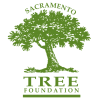Surprising ways trees affect our health
by Stephanie Robinson
September 9, 2021
Situated in a hot inland valley, Sacramentans regularly experience poor air quality. Spare the Air Days are common when temps soar above 95 degrees, and we even have burn bans in effect through much of the cooler seasons. The past several years, we’ve also had to contend with hazardous wildfire smoke in summer and fall, sometimes for weeks on end.

How it affects us
Breathing polluted air can affect our lungs. In areas with poor air quality, incidence of asthma and other respiratory issues is much higher.
Surprisingly, air quality has far-reaching impacts on other aspects of our health. Fine particulate matter is found in pollution such as auto and industrial emissions, smoke, agricultural dust, and even household chemicals. The tiniest particles, known as PM2.5, are small enough to enter not only our lungs, but our bloodstream.
Once in our bloodstream, these chemicals wreak havoc throughout our bodies, contributing to cardiovascular disease, autoimmune conditions, memory issues, and liver and kidney damage. When pregnant people are exposed to large amounts of these toxic particles, their babies can have lower birth weights and higher risk of infant mortality.
Some neighborhoods are affected more than others
Neighborhoods without a lot of large mature trees will feel the impacts of poor air quality much more than neighborhoods with ample canopy coverage. Similar to many other cities across the nation, Sacramento’s canopy is concentrated in primarily white, affluent neighborhoods due to redlining and other discriminatory housing practices.
Beginning in the 1930s, mortgage lenders categorized the desirability of neighborhoods based on their racial makeup. Non-white families were barred from obtaining mortgages in white neighborhoods. Meanwhile, the government poured funding into white neighborhoods, while denying this investment to lower-income communities and areas with people of color.
That investment included amenities like parks, trees, and green space and services to maintain those trees. As the city grew, freeways and industrial zones—sources of pollution—were constructed directly in the middle of redlined neighborhoods.
Although redlining has been banned for decades, its effects remain. The neighborhoods they designated desirable nearly a century ago are still affluent and predominantly white; the areas they deemed undesirable are still home to lower-income residents and people of color. It’s no surprise that with added pollution and less trees, residents of under-canopied areas also have higher incidence of diseases aggravated by poor air quality.

The good news?
Trees are a simple but powerful solution to help clean our air. Take a look at this photo that shows a couple strawberry tree leaves taken from a Sacramento yard in summer 2020, after smoky skies rained ash for days at a time. The leaf on the left is untouched, with visible bits of ash, dust, and other pollutants trapped on the surface. The leaf on the right is wiped clean.
One leaf might not hold much particulate matter on its own, but a mature tree can have up to 200,000 leaves that all remove this fine particulate debris from the air. Every year at the Tree Foundation, we plant nearly 12,000 trees. As these trees mature over the next 40 years, they will trap the particulate matter equivalent to taking 2,500 cars off the road for a year.
It adds up – we’ve been planting trees for nearly 40 years, and with your help, we’ll plant even more. Our efforts are focused in under-canopied communities where residents have expressed a desire for more trees and green spaces. We believe that everyone deserves a livable, lovable neighborhood, and we’re partnering with neighbors to bring their visions of greener communities to life.
How you can help
If you want to join us in working toward canopy equity, consider making a gift or volunteering.
If you live in an under-canopied neighborhood and want to share your story or vision, please reach out to Stephanie Robinson, Communications and Marketing Manager, at engage@sactree.org or (916) 974-4304.
